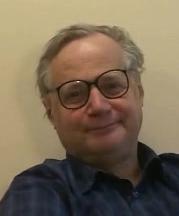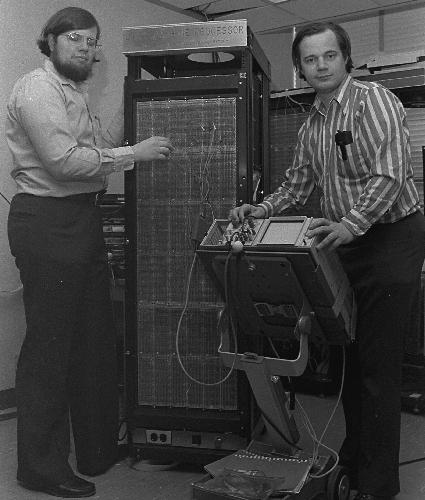Difference between revisions of "Richard Greenblatt"
GerdIsenberg (talk | contribs) (Created page with "'''Home * People * Richard Greenblatt''' File:RichardGreenblatt.JPG|border|right|thumb|Richard Greenblatt <ref>Image captured [http://www.computerhistory.o...") |
GerdIsenberg (talk | contribs) m |
||
| Line 3: | Line 3: | ||
'''Richard D. Greenblatt''', | '''Richard D. Greenblatt''', | ||
| − | an American computer programmer, along with [[Bill Gosper]] considered the co-founder of the [https://en.wikipedia.org/wiki/Hacker_culture hacker] community <ref>[https://en.wikipedia.org/wiki/Hackers:_Heroes_of_the_Computer_Revolution Hackers: Heroes of the Computer Revolution]</ref> . At [[Massachusetts Institute of Technology|MIT]], working for the [https://en.wikipedia.org/wiki/Project_MAC%7CProject Project MAC] (Machine-Aided Cognition), he was the main implementor of [[ | + | an American computer programmer, along with [[Bill Gosper]] considered the co-founder of the [https://en.wikipedia.org/wiki/Hacker_culture hacker] community <ref>[https://en.wikipedia.org/wiki/Hackers:_Heroes_of_the_Computer_Revolution Hackers: Heroes of the Computer Revolution]</ref> . At [[Massachusetts Institute of Technology|MIT]], working for the [https://en.wikipedia.org/wiki/Project_MAC%7CProject Project MAC] (Machine-Aided Cognition), he was the main implementor of [[Lisp#Maclist|Maclisp]] on the [[PDP-6]] and co-developer of the [https://en.wikipedia.org/wiki/Incompatible_Timesharing_System ITS] (Incompatible Timesharing System), the operating system on which MacLisp was developed. |
Richard Greenblatt was primary author of [[Mac Hack]] (The Greenblatt Chess Program) in 1966 and [[Timeline#1967|1967]], and along with [https://en.wikipedia.org/wiki/Tom_Knight_%28scientist%29 Tom Knight] main designer of the [https://en.wikipedia.org/wiki/Lisp_machine MIT Lisp machine]. In 1978 Mac Hack got adapted to the Chess-orientated Processing System [[CHEOPS]], one of the first dedicated hardware approaches in computer chess. | Richard Greenblatt was primary author of [[Mac Hack]] (The Greenblatt Chess Program) in 1966 and [[Timeline#1967|1967]], and along with [https://en.wikipedia.org/wiki/Tom_Knight_%28scientist%29 Tom Knight] main designer of the [https://en.wikipedia.org/wiki/Lisp_machine MIT Lisp machine]. In 1978 Mac Hack got adapted to the Chess-orientated Processing System [[CHEOPS]], one of the first dedicated hardware approaches in computer chess. | ||
Revision as of 21:28, 11 April 2018
Home * People * Richard Greenblatt

Richard D. Greenblatt, an American computer programmer, along with Bill Gosper considered the co-founder of the hacker community [2] . At MIT, working for the Project MAC (Machine-Aided Cognition), he was the main implementor of Maclisp on the PDP-6 and co-developer of the ITS (Incompatible Timesharing System), the operating system on which MacLisp was developed.
Richard Greenblatt was primary author of Mac Hack (The Greenblatt Chess Program) in 1966 and 1967, and along with Tom Knight main designer of the MIT Lisp machine. In 1978 Mac Hack got adapted to the Chess-orientated Processing System CHEOPS, one of the first dedicated hardware approaches in computer chess.
In 1979, Greenblatt founded Lisp Machines, Inc. to build and sell Lisp machines, competing with Symbolics, a company founded by his former MIT AI Lab fellows around Russell Noftsker, Tom Knight and Jack Holloway. Lisp Machines, Inc. went bankrupt in 1987.
Photos
Tom Knight and Richard Greenblatt (right) [3] [4]
Selected Publications
- Richard Greenblatt, Donald Eastlake, Stephen D. Crocker (1967). The Greenblatt Chess Program. Proceedings of the AfiPs Fall Joint Computer Conference, Vol. 31, reprinted (1988) in Computer Chess Compendium, pdf from The Computer History Museum or as pdf or ps from DSpace at MIT
- Donald Eastlake, Richard Greenblatt, Jack Holloway, Tom Knight, Stuart Nelson (1969). ITS 1.5 Reference Manual. pdf
- Hans Berliner, Richard Greenblatt, Jacques Pitrat, Arthur Samuel, David Slate (1977). Panel on Computer Game Playing. IJCAI 1977, pdf
- John Moussouris, Jack Holloway, Richard Greenblatt (1979). CHEOPS: A Chess-orientated Processing System. Machine Intelligence 9 (Jean Hayes Michie, Donald Michie and L.I. Mikulich editors) Ellis Horwood, Chichester, 1979, reprinted (1988) in Computer Chess Compendium
- Richard Greenblatt (1992). Wedgitude. ICCA Journal, Vol. 15, No. 4 » WCCC 1992 Workshop [5]
- Jaap van den Herik (1992). An Interview with Richard D. Greenblatt. ICCA Journal, Vol. 15, No. 4, pdf
External Links
- Richard Greenblatt from Wikipedia
- Oral History of Richard Greenblatt Video from The Computer History Museum
- Oral History of Richard Greenblatt (pdf) from The Computer History Museum
- History of LISP from The Software Preservation Group of The Computer History Museum
- Opening Moves: Origins of Computer Chess, Getting Going from The Computer History Museum
- Transcript of Richard Stallman's Speech, 28 Oct 2002, at the International Lisp Conference
References
- ↑ Image captured Oral History of Richard Greenblatt Video from The Computer History Museum
- ↑ Hackers: Heroes of the Computer Revolution
- ↑ Richard Greenblatt and Thomas Knight with the CADR LISP Machine at MIT, Courtesy of MIT, hosted by The Computer History Museum
- ↑ Moby Memory by Lawrence J. Krakauer
- ↑ Richard Greenblatt: "Wedgitude is not an accepted English word. It is a bit of hacker jargon, coined, I believe, by the famous hacker Bill Gosper. We say a system is wedged if there exists a binding, a clashing deep within its bowels, that prevents progress you would otherwise expect. Wedgitude, then, by a well-known English transformation, is the state of being wedged".
